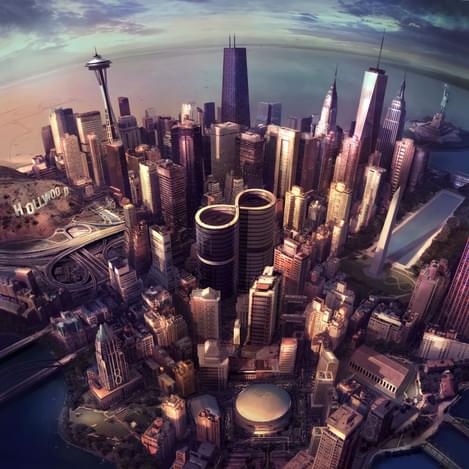Foo Fighters - Sonic Highways
"Sonic Highways"

Four years later, they pulled the same stunt again. “White Limo” wasn’t officially the first single off of Wasting Light, but it was the first cut to be uploaded to the web, and what a track it was; Dave Grohl screaming - through a thick layer of distortion - over genuinely incendiary riffs, and with Lemmy, of all people, making a comedy cameo in the video. It recalled “Weenie Beenie” from the band’s self-titled debut (which, in reality, was 99% Grohl), and that, coupled with the pledge that Wasting Light was recorded entirely to tape their frontman’s garage, seemed to hint at a new rawness for a band that had, since the turn of the century, been descending into dad-rock territory at frankly alarming pace.
We were disappointed again, though, as the only high points that the record offered up, “White Limo” notwithstanding, were a superb linkup with Bob Mould and the unintentional comedy of the ridiculous refrain on “Walk”; “I never wanna die! I never wanna die!” said nobody who listened to that horribly protracted cut. On Sonic Highways, at least, you can’t accuse the group of misleading their supporters as heinously as they had in the past. “Something from Nothing”, the opening track and first song shared from the album, kind of sums it up, even if it isn’t sonically representative of what’s to come; there’s silly, Dio-esque riffs, entirely valid roars from Grohl that he’s made something of himself from a modest background, and the kind of sterile production that has been a staple of Foos releases ever since One by One.
The concept behind Sonic Highways involved recording each of the eight songs in a different American city, although suggestions that it constitutes a love letter to the country’s musical heritage are a little wide of the mark; instead, it’s Grohl - who, as far as the band’s profile is concerned, is as much the embodiment of the Foo Fighters as he was when he was recording all the instruments himself - using his considerable clout to work with a slew of his heroes. “The Feast and the Famine”, recorded in Washington D.C., is a rollicking punk cut - their fiercest since “White Limo” - that features backing vocals from local legends Bad Brains. Their trip to the south is a mixed bag, meanwhile; “Congregation”, cut in Nashville with country star Zac Brown on lead guitar, is a heartland anthem that should go over well live - it could comfortably have slotted onto In Your Honor’s rock disc. “What Did I Do?/God as My Witness”, meanwhile, is probably the nadir not just of this record, but of the band’s entire catalogue; that’s saying something, as there were no shortage of contenders for that title on Echoes, Silence, Patience & Grace (or In Your Honor’s acoustic side, for that matter.)
The song’s first half sounds disconcertingly similar to “Sweet Home Alabama”, and the second just retreads that same ground, only with dafter guitars. It’s basically Be Here Now-era Oasis covering Kid Rock, and it is fucking awful. You kind of have to wonder if Grohl has ended up with too much autonomy; somebody, anybody, should have pointed out the striking parallels with one of the worst tracks ever committed to tape. “Outside” and “In the Clear”, meanwhile, are Foos on autopilot; the former has The Eagles’ Joe Walsh in the guest slot, so reinvention of the wheel was always going to be a big ask, but the inclusion of brass from New Orleans’ Preservation Hall Jazz Band on the latter is a nice touch.
The group’s trip to Seattle, meanwhile, probably had the potential to be the record’s messiest moment, but instead, it provides the highlight. Grohl could’ve hooked back up with Krist Novoselic in Nirvana's hometown, or perhaps gone down the more obvious route of a grunge exercise with members of Pearl Jam or Soundgarden. Instead, we get Ben Gibbard, from Death Cab for Cutie, lending guitar and backing vocals to the shimmering, atmospheric “Subterranean”; finally, we have the band moving in a new direction, and finally, we get some genuine emotional heft in the vocals, not just the rock star roar that has characterised every album post-There Is Nothing Left to Lose. The closer, “I Am a River”, is excellent, too; nobody does over-the-top bombast quite like Foo Fighters, and the scurrying strings at the climax are inspired; the lyrics are nonsensical, but they’re going to be roared back at the band by tens of thousands at Wembley next June.
Sonic Highways should be applauded both for its ambition - Foo Fighters don’t need to try to do things differently these days, so fair play to them for trying - and its cohesion, given it was recorded so disparately. The accompanying TV series, too, provides plenty of colour as to Grohl’s appreciation for American music, as well as serving as testament to the well-documented force of his personality; rarely has a man been so difficult to dislike. The album, by way of comparison, feels a little lightweight; we see flashes of their best and thumping evidence of them at their worst, but ultimately, Foo Fighters still feel no closer to making a late-era classic.
Get the Best Fit take on the week in music direct to your inbox every Friday

Bon Iver
SABLE, fABLE

Mamalarky
Hex Key

Florist
Jellywish





